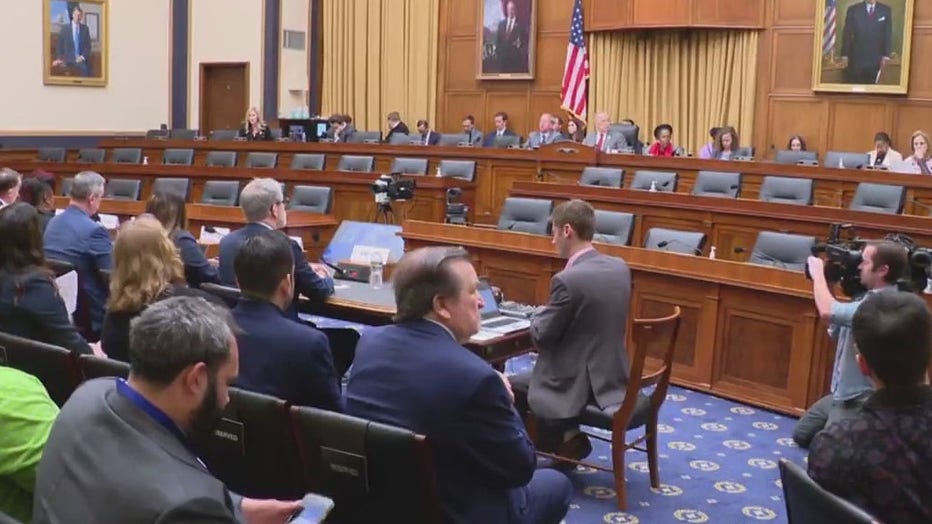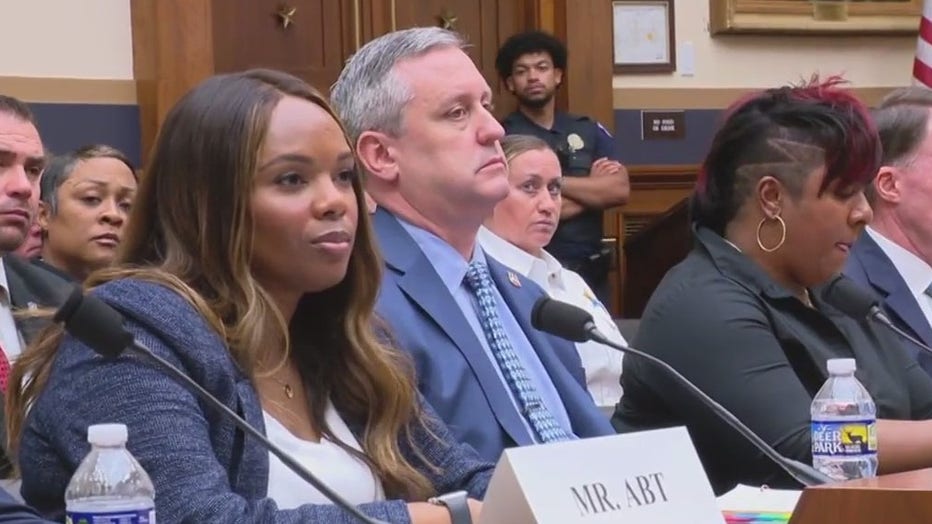DC's crime dilemma: Personal stories of violence emerge in House hearing

City Under Siege: DC crime takes center stage on Capital Hill
The U.S. House Judiciary Committee held a hearing Thursday billed as a meeting to examine "the rise of violent crime in the Democrat-Run Washington D.C. and the lack of prosecutions and prosecutorial accountability."
WASHINGTON - The U.S. House Judiciary Committee held a hearing Thursday billed as a meeting to examine "the rise of violent crime in the Democrat-Run Washington D.C. and the lack of prosecutions and prosecutorial accountability."
It was a very political hearing with finger-pointing at Biden-appointee, U.S. Attorney Matthew Graves (who was not in attendance Thursday).
However, at the end of the day, lawmakers on both sides agreed what's happening in the District needs to be addressed, especially when other cities have been able to lower violent crime – when D.C. has not.
Those who testified included Valor Brewpub’s founder, Gaynor Jablonski, who testified about being attacked over the summer by an armed suspect inside his Barracks Row business, as his 4-year-old son stood right there.
He also shared his frustration on how the suspect in his case received a plea deal.
It was mentioned that the prosecution asked for the maximum time the plea agreement would allow, but the judge went even lower.

"What I would change in the process if I could, is that the DA simply making his staff do their job," Jablonski told FOX 5. "I mean, how can you not win the case I had? What else do you want? The only thing that would’ve made this case more sensational is if I got shot."
"If you can’t try that case or win that case. I mean, you really suck at your job," he added. "It’s harsh but it’s true. The fact they pled this down and said we have to take our resources into account, just tells me that the overall sentiment in that office is just, move them forward."
The video from that assault was played in the Rayburn House Office’s Judiciary Committee room. Jablonski was among two other D.C. crime victims to testify.
The other two included a young man who described getting a gun pulled on him in the Shaw neighborhood while trying to go grocery shopping. The third was a D.C. firefighter who said she was attacked while responding to a call and did not feel safe doing her job.
Some of what was heard during Thursday’s two-hour hearing is not new.
Republicans blamed Democrats for being soft on crime and not supporting police. Democrats blamed Republicans for not supporting gun reform that could impact D.C. gun violence.

D.C.’s deputy mayor for public safety spoke about the ecosystem. She referred to the current state of D.C. crime as a "crisis."
The police union chair blamed the D.C. Council and rhetoric for stymieing recruiting and making policing jobs harder.
Something new came from an expert with the conservative think tank, the Heritage Foundation. The expert proposed handing the embattled D.C. Crime Lab to the ATF or FBI as well as moving the juvenile division to the U.S. Attorney’s office.
While some did not feel the hearing produced tangible results, two D.C. community leaders in attendance, who predominantly work in Northeast and Southeast D.C., saw this meeting as a plus.
"I do think that the idea of collaboration is something that’s always been talked about at the lower level, but it’s important that it’s something that trickles up in these cases, and not down – and that real collaboration happens and not just the lip-service that’s given to it," said 8C807 ANC Commissioner Salim Adofo.
Jay Brown, a community activist who began the group, Community Shoulders, agreed with Salim and also told FOX 5, "We have people on the Democratic side and the Republican side who have put their testimony on record. You just can’t put your testimony on record and then not follow through with some type of solution."
The deputy mayor spoke against moving the D.C. Crime Lab and Juvenile Division to the feds after making an argument for how D.C. needs to have more control to address crime issues, not less. This is also part of the argument for D.C. statehood, which D.C. Congresswoman Eleanor Holmes Norton testified in support of on Thursday.
After the hearing, U.S. Attorney Matthew Graves told FOX 5 in a statement, "Our goal is to get justice for victims. That’s why we are on pace to charge 6,000 cases this year alone and have had nearly 200,000 communications with victims year-to-date about their cases. We will continue to do all we can under D.C.’s criminal justice system to get the best outcome possible for victims."
The U.S. Attorney’s Office, seeking to clarify comments made in the hearing regarding sentencing for gun possession on Federal District Court versus D.C. Superior Court, shared an additional statement which reads:
"The claim that the U.S. Attorney’s Office could seek higher mandatory minimum sentences if it filed more "FIP" or felon in possession cases in District Court is not accurate. For violations of the federal law (18 U.S.C. 922(g)), the 5-year mandatory minimum only applies to defendants who possess or use a firearm in the commission of another violent offense. The D.C. Code also provides for a 5-year mandatory minimum for possessing a firearm during a crime of violence. For offenders charged with unlawfully possessing a firearm after a felony conviction and no other violent offenses, there is no federal mandatory minimum. However, the D.C. Code imposes a 1-year mandatory minimum in all cases and a 3-year mandatory minimum if the prior conviction was for a crime of violence."


